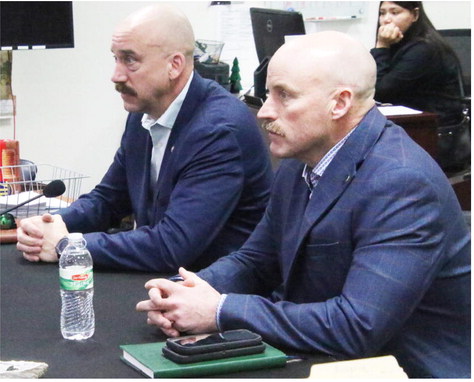Local Government Bills Head To Senate Floor
Sen. Jeremy Trebas figures he might see his face on a campaign postcard sooner or later with an attack: “‘Jeremy Trebas wanted to raise your property taxes in an unlimited manner.’” But Trebas, a Great Falls Republican, has a rationale for pitching Senate Bill 548, and Democrats and other Republicans joined him in sponsoring it.
SB 548, heard on Friday, March 31, and passed out of committee the same day on a 9-3 vote, eliminates a mill levy restriction for local governments.
Currently, local governments calculate property tax levies at half the rate of inflation the last three years — and the math creates a problem, Trebas said.
“You’re always going to be keeping up at best by half, I guess, is the best way to say it,” he said.
At the hearing, Sen. Russ Tempel, R-Chester, wanted to know the reason the bill seemed to have odd bedfellows as sponsors, people he said were on the “way right” or “way left.”
Other sponsors are Sen. Christopher Pope, D-Bozeman, and Rep. Ed Butcher, R-Winifred.
Trebas said he shopped the bill around, and it was a tough sell. However, at the meeting, Sen. Mary Ann Dunwell, D-Helena, asked if she too could join as a sponsor too.
The bill is among three dealing with local government coffers that made it out of committee and will be heard on the Senate floor Monday on second reading.
Senate Bill 523 would change the way local governments can use tax increment finance districts.
Local governments use those districts as an economic development tool to temporarily invest the tax growth of an area back into that district. The idea is the temporary shot in the arm pays dividends down the road for public coffers as the area revitalizes.
Proponents argue the districts are one of the only levers local governments have to influence urban renewal and add value to the tax base, including in places that are expensive environmental cleanup sites.
Opponents argue they pull too much money from schools, are used too liberally and for too long, and can go to support larger companies that don’t need help.
Sponsor Sen. Greg Hertz, R-Polson, said some local governments have been using the tool to provide “corporate welfare” to out-of-state corporations wanting to develop in Montana. And Hertz, chairperson of the Senate Taxation Committee, said some districts seem like they’re “living forever.”
As amended, the bill would allow districts to run for 30 years instead of 40, it would remove school levies from the calculation, and it would limit administrative costs. It also would limit urban renewal districts to cover not more than 7% of the total taxable value of an entire taxing jurisdiction.
Senate Bill 511, by Sen. Daniel Zolnikov, R-Billings, also changes the way local governments can grow and pay for services. At the hearing, just two people spoke in favor of the bill, and many representatives from local government and economic development opposed it.
The Governor’s Office spoke in support of the bill as a way to cap the fiscal growth of local governments and put sideboards on how much they can grow their budgets. The idea was that doing so would limit how fast property taxes increase for residents and businesses.
However, representatives from local governments said growth isn’t because local elected officials are irresponsible. Rather, they argued the growth comes in part because voters support new spending for items such as libraries, and it also comes from pulling in federal grants.
As amended, the bill does away with the limit on local government levies increasing at half the rate of inflation. Instead, it sets the property tax increase to the average rate of inflation, not to exceed 4 percent a year.
It also limits the amount of newly taxable value a local government can assess to 50 percent. And it adds a revenue cap on a local government’s mill levy authority of 4.75 percent from the previous year.
Montana doesn’t have a sales tax, and at the meeting, people raised that issue as a solution the state still needs to consider. Initially, the bill limited the amount of newly taxable value a local government could assess to 25 percent, and opponents said without being able to tap new growth, local governments couldn’t pay for things like new police officers and firefighters given the tax structure in Montana.
Another bill also heard Friday proposed a local option sales tax, but that one, Senate Bill 551, was tabled in the Senate Tax Committee.
Proposed by Sen. Pope, SB 551 would have allowed Montana’s largest cities to vote to implement an up to 3 percent tax on “tourism-oriented goods and services” in their communities, with 50 percent of the revenue going to property tax relief. It had similarities to the state’s resort tax.
Bob Story, executive director of the Montana Taxpayers Association, opposed the bill, but he said taxpayers are overburdened, and members of the committee were in an unenviable position.
The bill would create great relief and provide another source of revenue for five cities, he said. But what happens to everyone else? Would the population in those cities then support another tax in the future to fix the problem for the rest of Montana?
“You have a tough decision to make,” Story said.

